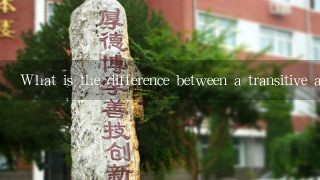What is the difference between a transitive and a intransitive verb?

Sure, here's the difference between transitive and intransitive verbs:
Transitive verbs:
- A transitive verb takes a direct object that receives the action of the verb.
- The direct object can be a person, place, thing, or phrase.
- Examples of transitive verbs include:
- She read a book.
- The dog licked its fur.
- The child gave a gift to his friend.
Intransitive verbs:
- An intransitive verb does not take a direct object.
- The verb expresses an action or state that is being performed on something or someone.
- The object of an intransitive verb is often implied or omitted.
- Examples of intransitive verbs include:
- She sang a beautiful song.
- The flowers bloomed in the garden.
- The car moved down the road.
Transitive verbs are often used to convey a relationship between two or more entities, while intransitive verbs are often used to express an action or state that is being performed on something or someone.















































































































